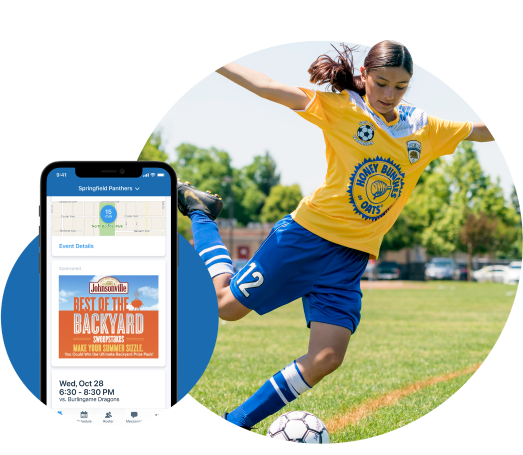Effective Healthcare Marketing Strategies That Will Reach Families
Learn how to build brand awareness and drive patient volume with youth sports.
Learn More

Promote your healthcare organization to families with TeamSnap
TeamSnap empowers healthcare organizations to create authentic relationships with families through youth sports sponsorships and digital media targeting families in the #1 youth sports coordination app. Unlike other marketing channels, we engage families when and where it matters most - at the field, at home, and on the go.
Learn how our partners including GoHealth Urgent Care, Seattle Children’s Hospital, and One Medical use TeamSnap to reach the Chief Household Officer.
Learn MoreWhat is Healthcare Marketing?
Healthcare marketing is a strategic process that healthcare organizations use to communicate their value and services to patients, physicians, and other stakeholders. It encompasses a wide range of activities, from advertising and promotions to digital marketing and community engagement. In the highly competitive healthcare industry, effective marketing is essential for hospitals and healthcare organizations to attract patients, build trust with the community, and differentiate themselves from competitors.
Advertising, marketing, and digital marketing play crucial roles in this process by helping healthcare organizations reach their target audience, increase brand awareness, and ultimately drive patient engagement and loyalty.
Advertising: Healthcare advertising involves the promotion of healthcare products, services, or organizations through various channels such as print, TV, radio, online ads, and billboards. Advertising helps healthcare organizations reach a broad audience and create awareness about their offerings. It allows them to communicate key messages, such as the quality of care, expertise of healthcare professionals, and unique services offered. Effective healthcare advertising can influence patient decisions and encourage them to choose a particular healthcare provider or service.
Another key element of effective healthcare marketing is a thorough understanding of your patients and target audience. A major part of healthcare marketing includes market research, branding, public relations, and customer relationship management. It aims to create a positive image of the healthcare organization, build trust with patients, and differentiate the organization from competitors. By focusing on patient needs and preferences, healthcare marketing can drive patient engagement and loyalty.
Digital marketing has elevated the game for healthcare organizations by allowing them to connect and reach patients 24/7. Digital marketing offers several advantages, including the ability to target specific demographics, track campaign performance, and personalize messages. It allows healthcare organizations to deliver relevant content to patients, educate them about health issues, and promote services. Digital marketing also enables two-way communication, allowing patients to interact with healthcare providers and share feedback. This engagement can lead to increased patient loyalty and satisfaction.
Examples of Successful Healthcare Marketing
Several healthcare companies have executed successful marketing plans to build trust with their communities and attract patients. For example, Cleveland Clinic, a renowned healthcare provider, launched a campaign called "Empathy: The Human Connection to Patient Care." This campaign focused on the emotional aspect of healthcare, highlighting the importance of empathy in patient care.
Another example is Mayo Clinic, which is known for its innovative marketing strategies. Mayo Clinic uses a combination of digital marketing, content marketing, and community engagement to reach its audience. Their "Mayo Clinic Radio" podcast, for instance, provides valuable health information to listeners and helps position Mayo Clinic as a trusted source of healthcare information.
Five Effective Healthcare Marketing Strategies
Digital Marketing: Utilize digital channels such as social media, search engines, and email marketing to reach and engage with patients.
Content Marketing: Create and share valuable, relevant content to attract and retain patients, such as blog posts, articles, and videos. Some relevant content may be a “what to do” questions and answer, or a FAQs section. Also offering testimonials and real examples of patient stories are familiar and usually effective for patients coming across the content.
Community Engagement: Engage with the local community through sponsorships, events, and partnerships to build trust and brand loyalty. One of the best ways to reach communities is through sports sponsorships that meet families and players at the field when they are doing what they love and celebrating sports and healthy living.
Search Engine Optimization (SEO): Optimize website content to improve search engine rankings and attract organic traffic.
Patient Referral Programs: Implement programs to encourage satisfied patients to refer others to the healthcare organization.
Personalized Marketing Strategies to Engage with Patients
In today's healthcare market, organizations are increasingly focusing on personalized marketing strategies to engage with patients on a more individual level.
Create a great website! One way to stand out in a saturated space is to have an informative and personalized website experience. Focus on answering questions that patients may have when coming to your site, and consider having a patient portal to make it even more personalized.
Leverage clinical data to personalize the experience. The website will likely already collect consumer data which will be helpful when coming up with a personalized approach to marketing. Using the consumer data to improve language, flow of copy on the website, and email marketing will be an effective tool to better reach consumers.
The Ins and Outs of Healthcare Marketing Today
A trend that has become less common is relying solely on promotional messaging without providing valuable educational content. Today, healthcare marketers are focusing more on providing informative and engaging content that educates patients and builds trust, rather than simply promoting services.For example, Mount Sinai Health System launched a content marketing campaign called "Road to Resilience," which features stories of patients overcoming health challenges.
Additionally, the use of generic, one-size-fits-all marketing campaigns is becoming less common. Healthcare marketers are increasingly recognizing the importance of personalization and are tailoring their messages to specific patient demographics and preferences.
Overall, the trends in healthcare marketing are shifting towards more targeted, personalized, and informative approaches that prioritize building relationships with patients and providing value beyond just promotional messaging.By implementing these strategies, healthcare organizations can effectively reach and engage with their audience and ultimately drive patient acquisition and loyalty.